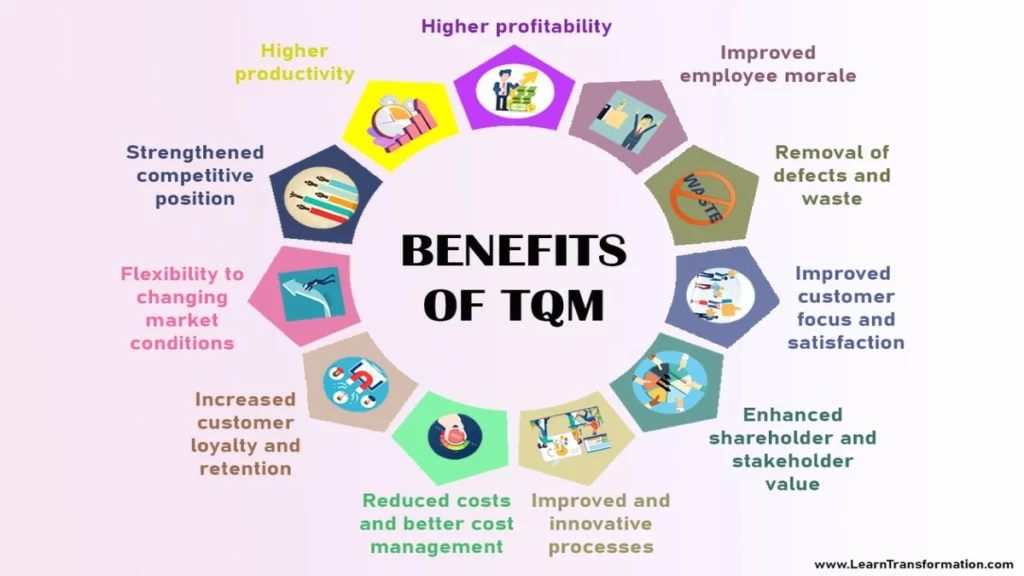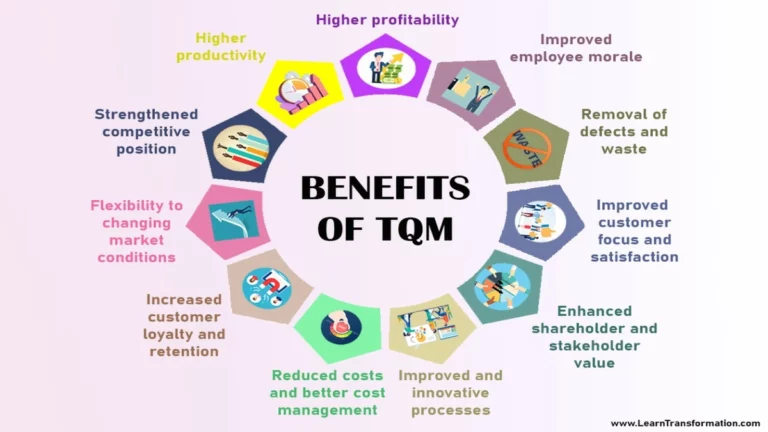“Sometimes when you innovate you make mistakes. It is best to admit them quickly and get on with improving your other innovations.”—Steve Jobs
What is Total Quality Management System ?
Tqm stands for total quality management. The definition of the total quality management system is a management approach to long-term success through customer satisfaction. TQM can be summarized as in management system for the customer-focused organization that involves all employees in continual improvement.
The principles of total quality management are customer focus, leadership, involvement of people, process approach, system approach to management, continual improvement, factual approach to decision making and mutual benefit supplier relationship. Let’s dig into all the principles of TQM in detail.

What are 8 Principles of Total Quality Management?
1. Customer Focus
Out of the eight total quality management principles, the first one is customer focus. It stresses that an organization should understand its customer’s needs, what they want and when they want it and at the same time, try to meet and exceed their expectations.
If your product fulfills a need and stands on the expectations of the customers when you understand what your customer wants or needs, then you have a better scope of figuring out how to get the right materials for your product, the best process and the right people involved. Then you will be able to exceed their expectations.
Read Also: VSM (Value Stream Mapping): 3 Sections, How to Perform VSM?
2. Leadership
The next principle of total quality management is leadership good leaders help to unite an organization and give people a sense of direction. They create an environment where everyone’s views are given careful consideration. Therefore, without clear leadership, an organization will lose its direction.
This principle tells us that leaders are important in setting goals and ensuring that all their employees are actively involved in achieving these objectives.
Leader’s Tip
Foster a culture of quality by empowering employees, fostering innovation, and fostering a customer-centric mindset across the organization.
3. People’s Involvement
People are the essence of any organization research has shown that when people understand the importance of their contribution and role in their organization, they become innovative and eager to participate. This principle helps the management to communicate with its employees.
4. Process Approach
This principle stresses on efficiency, effectiveness, consistency and understanding. Results in speeding up activities, improving consistency, eliminating ways and reducing costs, and promoting continuous improvements help. It involves quality control compared with standards and takes corrective actions. If there is a deviation.
5. System Approach to Management
This principle involves identifying, understanding and managing interrelated processes as a system contributes to the organization, effectiveness and efficiency in achieving its target.
6. Continuous Improvement
This principle should be a permanent objective of any organization. This principle states that continual change should be an active business objective. By doing so, organizational flexibility increases, ability to embrace new opportunities and improve performance is achieved.
7. Factual Approach to Decision Making
This principle involves effective decisions and actions based on available data. Decisions based on facts improve understanding of the product. So implementing this principle will allow decisions to be made with more clarity and objectivity
Leader’s Tip
Implement effective communication channels, encourage feedback, and provide training and development resources to support TQM initiatives.
8. Mutual Beneficial Supplier Relationship
This principle. Identifies the independence of the organization from its suppliers. It ensures a mutually beneficial relationship between the two, which will enhance productivity and encourage working values.
Handpicked for you – Importance of Quality Transformation in VUCA world
Whta is the Importance and Benefits of Total quality management?
TQM principles foster mutual respect and teamwork among their employees. This is true because TQM principles stimulate a single organizational culture of excellence and ensure that employees uphold the same principles of work.
Also, the application of TQM principles helps organizations to put strategic approaches in place to ensure the quality of products and services. This also means making sure the suppliers offer quality products.
It is important that organizations build quality into the processes involved in producing goods and services and measures for continual improvement taken to ensure these processes work all the time, it is important that organization empower their employees, which continues training to develop their skills.
Frequently Asked Questions (FAQs)
What are the importance and benefits of total quality management ?
TQM principles foster mutual respect and teamwork on their employees. This is true because TQM principles stimulate a single organizational culture of excellence and ensure that employees uphold the same principles of work. Also, the application of TQM principles helps organization to put strategic approach in place to ensure the quality of product and services.
What are the principles of total quality management ?
Customer Focus, Leadership, People Involvement, Process Approach, System Approach to Management, Continuous Improvement, Factual Approach to Decision Making, Mutual Beneficial Supplier Relationship
What do you mean by total quality management?
The definition of total quality management system is a management approach to long term success through customer satisfaction. TQM can be summarized as in management system for the customer focused organization that involves all employees in a continual improvement.
What is the purpose of total quality management ?
The application of total quality management TQM principles helps organizations put strategic approaches in place to ensure the quality of products and services. This also means making sure the suppliers offer quality products.
Key Takeaways
- Total Quality Management emphasizes the importance of customer satisfaction, process improvement and employee engagement to an organization’s success.
- Key principles of TQM include a focus on quality at every stage, data-driven decision-making, and a commitment to continuous learning and improvement.
- TQM requires leadership commitment, a collaborative culture, and the integration of quality practices into all aspects of the organization to achieve sustained excellence.

